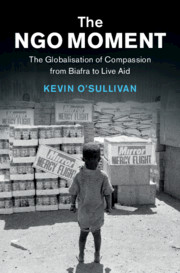Refine search
Actions for selected content:
33 results
Donor Requirements and CSO Performance: A Comparative Analysis of Core and Project Funding Mechanisms in Swedish Development Cooperation
-
- Journal:
- Voluntas: International Journal of Voluntary and Nonprofit Organizations / Volume 36 / Issue 6 / December 2025
- Published online by Cambridge University Press:
- 03 February 2026, pp. 1030-1043
-
- Article
-
- You have access
- Open access
- HTML
- Export citation
Resource-Based Accountability: A Case Study on Multiple Accountability Relations in an Economic Development Nonprofit
-
- Journal:
- Voluntas: International Journal of Voluntary and Nonprofit Organizations / Volume 25 / Issue 3 / June 2014
- Published online by Cambridge University Press:
- 01 January 2026, pp. 772-796
-
- Article
- Export citation
6 - Philippines’ Rapid Geothermal Growth
-
- Book:
- Governing Energy Transitions
- Published online:
- 26 September 2025
- Print publication:
- 16 October 2025, pp 130-160
-
- Chapter
-
- You have access
- Open access
- HTML
- Export citation
4 - Regulatory Evolution of Renewable Energy in Indonesia
-
- Book:
- Governing Energy Transitions
- Published online:
- 26 September 2025
- Print publication:
- 16 October 2025, pp 61-92
-
- Chapter
-
- You have access
- Open access
- HTML
- Export citation
5 - Indonesia’s Slow Geothermal Evolution
-
- Book:
- Governing Energy Transitions
- Published online:
- 26 September 2025
- Print publication:
- 16 October 2025, pp 93-129
-
- Chapter
-
- You have access
- Open access
- HTML
- Export citation

Governing Energy Transitions
- A Study of Regime Complex Effectiveness on Geothermal Development in Indonesia and the Philippines
-
- Published online:
- 26 September 2025
- Print publication:
- 16 October 2025
-
- Book
-
- You have access
- Open access
- Export citation
6 - Market-Friendly Human Rights
-
- Book:
- Latin America and Human Rights Politics in West Germany, 1973–1990
- Published online:
- 18 October 2025
- Print publication:
- 18 September 2025, pp 223-263
-
- Chapter
- Export citation
3 - Remittance Machines
- from Part I - Separation Anxieties
-
- Book:
- Foreign in Two Homelands
- Published online:
- 31 August 2024
- Print publication:
- 31 October 2024, pp 137-174
-
- Chapter
-
- You have access
- Open access
- HTML
- Export citation
Aiding Higher Education with Export Expansion in the Developing World
-
- Journal:
- World Trade Review / Volume 22 / Issue 5 / December 2023
- Published online by Cambridge University Press:
- 27 July 2023, pp. 608-628
-
- Article
-
- You have access
- Open access
- HTML
- Export citation
10 - Hazards from the Global South (1970–1972)
-
- Book:
- Trading Power
- Published online:
- 14 October 2022
- Print publication:
- 03 November 2022, pp 296-326
-
- Chapter
- Export citation
Chapter 3 - From the Local to the Global
-
- Book:
- African Peacekeeping
- Published online:
- 13 January 2022
- Print publication:
- 03 February 2022, pp 99-128
-
- Chapter
- Export citation
5 - NGOs and Development
- from Part III: - Conduits of World Culture
-
- Book:
- The NGO Moment
- Published online:
- 01 October 2021
- Print publication:
- 14 October 2021, pp 99-116
-
- Chapter
- Export citation
5 - NGOs and Development
- from Part III - Conduits of World Culture
-
- Book:
- The NGO Moment
- Published online:
- 01 October 2021
- Print publication:
- 14 October 2021, pp 99-116
-
- Chapter
- Export citation
Conclusion
- from Part IV - A People’s Compassion
-
- Book:
- The NGO Moment
- Published online:
- 01 October 2021
- Print publication:
- 14 October 2021, pp 175-185
-
- Chapter
- Export citation
2 - Putting Down Roots
- from Part I - The Ends of Empire
-
- Book:
- The NGO Moment
- Published online:
- 01 October 2021
- Print publication:
- 14 October 2021, pp 34-54
-
- Chapter
- Export citation
Conclusion
- from Part IV: - A People’s Compassion
-
- Book:
- The NGO Moment
- Published online:
- 01 October 2021
- Print publication:
- 14 October 2021, pp 175-185
-
- Chapter
- Export citation
Introduction
-
- Book:
- The NGO Moment
- Published online:
- 01 October 2021
- Print publication:
- 14 October 2021, pp 1-14
-
- Chapter
- Export citation
Introduction
-
- Book:
- The NGO Moment
- Published online:
- 01 October 2021
- Print publication:
- 14 October 2021, pp 1-14
-
- Chapter
- Export citation
2 - Putting Down Roots
- from Part I: - The Ends of Empire
-
- Book:
- The NGO Moment
- Published online:
- 01 October 2021
- Print publication:
- 14 October 2021, pp 34-54
-
- Chapter
- Export citation

The NGO Moment
- The Globalisation of Compassion from Biafra to Live Aid
-
- Published online:
- 01 October 2021
- Print publication:
- 14 October 2021
